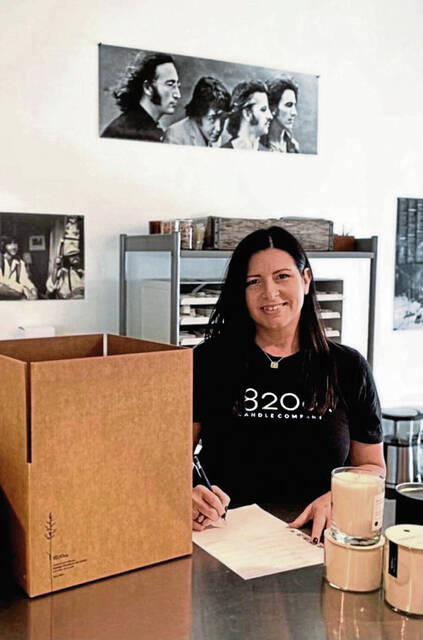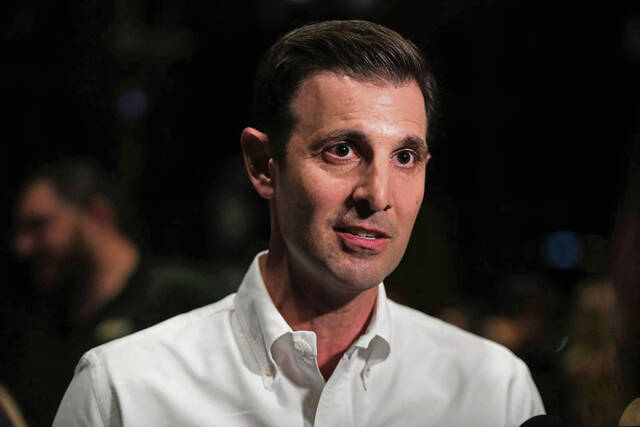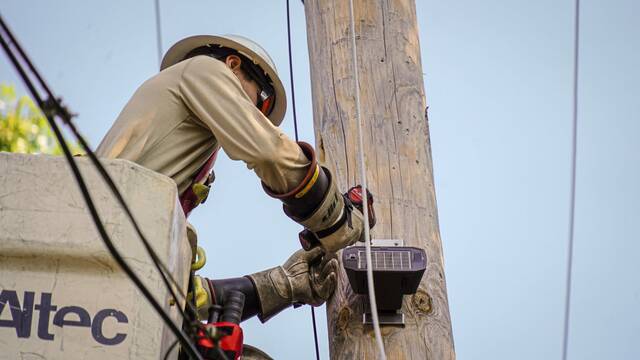EAST PALESTINE, Ohio — Kat Smith has seen her share of ups and downs this year.
In February, days after a Norfolk Southern train derailed in East Palestine and a controlled chemical burn spewed plumes of smoke into the sky, doctors diagnosed Smith with bronchitis because of toxin exposure. When it rained, she said, she had such trouble breathing that she couldn’t get out of bed.
Smith spent six weeks living in a Boardman, Ohio, hotel about 15 miles away with her husband, two of her three children and a 5-year-old Goldendoodle named Zeke.
Then on July 15, after Smith returned to East Palestine, she opened a jewelry shop, Kat’s Krystals, in a former lawyer’s office in the village’s quaint business district. On opening day, lines of customers snaked down North Market Street.
The shop became the first new business to open in East Palestine since the derailment.
“It was like, ‘Maybe there’s hope for this town,’ ” said Smith, 41, who moved to Ohio eight years ago. “A lot of people said, ‘Give it six months. This place will be a ghost town.’ Maybe this shop kind of helped people think that’s not the case.
“I think this town is worth fighting for.”
Smith is an example of rebirth in East Palestine — a town of 4,700 people on the Ohio-Pennsylvania border that has struggled to bounce back from the Feb. 3 derailment.
Now, more than six months later, Smith and other residents still are working to move forward amid a backdrop of continuing environmental remediation, monitoring, political activism and efforts by railway giant Norfolk Southern to make things right.
Financial support
Norfolk Southern has spent tens of millions of dollars responding to the disaster.
The company said it has poured $65 million into East Palestine and surrounding communities since the derailment. Its top executive wants area residents to be “proud” of their response.
“At the six-month mark, I’m really pleased with our progress,” CEO Alan Shaw told the Tribune-Review last week. “It’s not just writing a check. That’s the easy thing to do. It’s the personal relationships.”
Some 300 Norfolk Southern staffers set up shop in an East Palestine church Feb. 3 and then stuck around to perform cleanup work and assist residents how they could, Shaw said. Contractors remediating the derailment site should wrap up by the end of this year.
The company, valued at $53.1 billion, runs a Family Assistance Center in East Palestine’s business district and is looking to establish a permanent home there, Shaw said. Shaw visited the town recently to donate a firetruck.
The $65 million has included $25 million to revitalize East Palestine City Park, which Shaw called a town treasure.
About $8.5 million has gone to Western Pennsylvania, he said. On July 24 alone, Norfolk Southern sent $1 million in what it called community relief funds to Western Pennsylvania, including $660,000 to Beaver County’s Darlington Township and $340,000 to Lawrence County, Gov. Josh Shapiro said. Local leaders will determine how to use the money.
“Know this is not a settlement but a small step forward,” said Mike Carreon, chairman of Darlington Township’s board of supervisors.
On Thursday, Norfolk Southern gave Darlington Township $544,700 to repair a local road, bringing investment there to $1.2 million. The company also donated $1 million to the Pittsburgh Foundation, Shaw said.
But there’s a bigger picture, Shaw said. The company plans to address property values — and help financially support residents who are selling their homes — if the market dips. Shaw also committed to funding long-term environmental monitoring and building a health care fund.
“We’re going to be here five years from now. We’re going to be here 10 years from now,” Shaw said. “I want people in East Palestine and the surrounding communities to be proud of our response.”
‘Something very, very real’
When covid-19 hit Pennsylvania, Hilary Flint was diagnosed with renal cell carcinoma, a form of cancer.
Surgeons removed lymph nodes and a kidney. Flint turned to “experimental therapies” such as high-dose vitamin C.
She’s been cancer-free for three years but worries her medical history leaves her vulnerable to pollutants from the derailment.
“I’m a ‘better safe than sorry’ type of person,” said Flint, 31, of Darlington Township. “I don’t think we understand the severity of the problems yet with the air.”
Flint, who lives about 5 miles from what residents call Ground Zero, fled the derailment smoke to a Monaca hotel. When she returned home, she was assaulted with a “sweet, almost bleachy smell” that seemed to follow her everywhere.
Flint invited Wayne State University researchers into her home, where they found ethylhexyl acrylate, which the EPA calls a probable carcinogen and chemical used in making paints and plastics.
The same researchers found vinyl chloride, which the derailed Norfolk Southern trains carried, in Flint’s outdoor fire pit.
“It went from being what I think is possible to being something very, very real,” she said.
Flint, a nonprofit fundraiser, didn’t take the news lightly.
She helped start the Unity Council for East Palestine Train Derailment with residents from Pennsylvania and Ohio. The group protested in Columbus. In July, they lobbied in Washington, D.C., for federal aid to East Palestine.
Flint, a registered Democrat, said she was most impressed by U.S. Sen. J.D. Vance, an Ohio Republican.
“We met with Democrats, Republicans and independents. This isn’t political; it’s about lives,” Flint said. “Once we realize what has happened and how these chemicals do not leave, a lot of these residents are going to be left with nothing.”
Flint said she hasn’t accepted any money from Norfolk Southern and hasn’t filed any lawsuits.
“As a cancer survivor, my risk is very different,” Flint said. “For now, I’ll keep my voice free and open.”
Conflicting information
After his business was flooded in 2006, Scott Smith — no relationship to Kat Smith — developed new life goals. The investigator started traveling to disaster sites, helping residents fight for environmental justice. He’s been to 60 sites so far.
Scott Smith started looking for dioxin in Sulphur Run, a creek running through East Palestine, in February.
Dioxin, a burning byproduct, is highly toxic and can cause cancer, reproductive and developmental problems and immune system damage and can interfere with hormones, the EPA said.
Smith said he found more than 50 chemicals in Sulphur Run and more than 1,000 combinations of toxins.
“We really don’t know what these chemicals do,” Smith said.
He said the derailment “was releasing more dioxins and dust into the air. That’s going into the water.”
On Feb. 22, Smith’s sediment samples showed levels of the dioxin heptachlorodibenzo-p-dioxin at 330 parts per trillion, which he called a high number. The number dropped to 35 parts per trillion March 8.
But, on May 29, the dioxin level spiked to 910 parts per trillion, Smith said. He thinks that might be caused by contractors excavating contaminated soil at the derailment site.
Others tell a different story.
The state Department of Environmental Protection has said there are no long-term air or water concerns related to the derailment.
The DEP sampled private drinking-water wells within a 2-mile radius of the derailment site, as well as public water supplies in Ellwood City and Beaver Falls, officials said. Surface waters — streams and rivers — were sampled within a 1-mile radius.
The DEP sampled soil at some 100 locations within the 2-mile radius, officials said. Researchers tested an area nearly 3½ miles downwind of the derailment site. They also took samples from, among other places, schools in Beaver County’s Blackhawk School District.
In a statement, the DEP said it does not expect “short- or long-term impacts to groundwater or surface waters” in Pennsylvania.
Also, groundwater near the derailment site in Ohio flows south and westward and, as a result, would not carry possible contaminants toward groundwater wells in Pennsylvania, officials said. The DEP doesn’t appear to have records of testing in Sulphur Run.
In July, Ohio Gov. Mike DeWine asked the federal government for help.
DeWine is unsure how FEMA will respond because FEMA deals with property damage and reimbursements where there’s no private payer to cover the costs of rebuilding. A DeWine spokesman said that doesn’t apply in East Palestine because Norfolk Southern has covered or offered to cover repair costs.
“People look at this situation, and they see people in floods getting FEMA checks,” Dan Tierney, DeWine’s press secretary, told the Tribune-Review. “We are not saying people should not have that compensation. … Our understanding is just that it will not be through FEMA.
“People clearly see East Palestine as a disaster. And we agree with them.”
‘We’re picking up the pieces’
People are helping.
The state Health Department opened a pop-up Health Resource Center in March in Darlington Township. In one week, nearly 500 residents signed up for free, independent water and soil testing and got medical evaluations.
The same month, Shapiro announced $1 million in Norfolk Southern reimbursements to state fire departments and first responders.
“The Shapiro administration has been on the ground in Western Pennsylvania since the first hours after Norfolk Southern’s train derailment, and we will continue to be here to support the people and communities that have been impacted,” Shapiro press secretary Manuel Bonder told the Trib.
Second Harvest Food Bank of the Mahoning Valley was in East Palestine from Day 1.
The Youngstown group runs two food pantries in the village. For six weeks after the derailment, they sent staffers three times a week, every week, to deliver food, cleaning supplies and bottled water to those affected.
The group distributed 500 air purifiers donated by Carrier to low-income families, said Mike Iberis, Second Harvest’s executive director. CVS gave the group health and beauty products, and Home Depot donated a tractor-trailer load of cleaning supplies, household goods and about 80 air purifiers.
“Our donors answered the call, and our supporters answered the call to help their neighbors,” Iberis said. “Most of the people are back. And things have gotten back to — I won’t say normal. It’s not normal.
“But we’re picking up the pieces.”
‘This is not a political issue’
Daren Gamble, who has lived in the same East Palestine home his whole life, looks at his hometown and frets.
“People are saying, ‘Oh, everything’s fine in East Palestine,’ but it’s not fine,” said Gamble, 60, a retired bricklayer who lives about a half-mile from the derailment site. “It’s no better now than it was on Feb. 3.”
Gamble feels Norfolk Southern is delivering on promises. He doesn’t even know how much they’re paying for the Airbnb rental where he has lived since March in Guilford Lake, 20 miles west of East Palestine.
Gamble went to Washington, D.C., with the Unity Council to make legislators aware of his town’s struggles. He worries the legislative response will be shallow.
“For everybody, this is a photo op,” said Gamble, whose nine granddaughters all live in East Palestine. “But we’re playing with people’s lives. This is not a political issue. It’s a people issue.”
‘There’s not a lot of quit in these people’
Melissa Smith’s family has lived in East Palestine for seven generations.
Her ancestor, Revolutionary War veteran Bernard Boatman, purchased a farm there in 1802, she said. (She is not related to Kat Smith or Scott Smith.) Today, she runs a candle shop in East Palestine. Her eclectic products are sold in Pittsburgh and the clothing store Anthropologie.
“We have a connection here for a long time. The thought of leaving would be tragic,” said Melissa Smith, 54, whose 165-acre farm sits less than a half-mile from the derailment site. “It’s not just a place I have my home and my business. We have a lot of history here.”
Melissa Smith keeps moving forward. Her family sold feeder cattle and steers — nothing destined to become food — this spring, as well as hay for horses, after water and soil testing revealed a lack of contaminants.
Norfolk Southern reimbursed her $400 for the tests.
She also worked with Ohio State University researchers on “plant-tissue sampling” in her pasture, examining everything down to the root. Nothing turned up.
“People were looking to find things, but they did not,” she said. “I have a lot of people that find that hard to believe. ‘Oh, you must have contaminated water,’ ‘Oh, your animals must be sick.’ But I feel with confidence that we’re good.”
Then there’s Kat Smith.
She thinks East Palestine has more fight left in it.
“We’re getting where we need to be, but we’re not there yet,” she said. “The farmers, the workers, they’re people who get their hands dirty for a living. That’s the mentality, to dig in and keep going.
“There’s not a lot of quit in these people.”



















